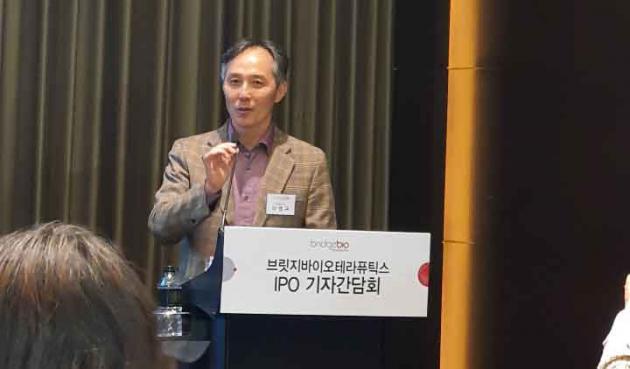Bridge Biotherapeutics revealed its goal to become Korea's top no research and development only (NRDO) company, on the occasion of its initial public offering (IPO).

The NRDO business model, which specializes in the field of development, promotes preclinical and clinical development after introducing new drug candidates from outside sources such as academia, government-funded research institutes, and companies.
"Rather than performing a relatively time-consuming phase of finding candidates, the licensing-in of a candidate substance allows rapid development, commercialization, and profit generation," Bridge Biotherapeutics CEO Lee Jung-kue said. "Our company is committed to providing effective new innovative medicines in areas of high but unmet medical needs where patients have difficulty receiving treatment."
Lee stressed that the company's robust global clinical development network and a horizontal collaborative culture had reduced the preclinical duration to half the industry average.
According to Lee, the preclinical duration for the industry takes an average of 18 months. However, the company managed to shorten the time to nine months. "Such quick development has become possible because Bridge Biotherapeutics is a development-centered biotech firm with a small number of specialized development experts, which maximizes the possibility of receiving sales approval and treating patients, Lee added.
Due to its robust development and research ability, the company has signed the most massive case for technology transfer among local pharmaceutical and bioindustry firms, on a single compound basis with Boehringer Ingelheim for BBT-877, idiopathic pulmonary fibrosis (IPF) treatment candidate.
Under the contract, Bridge Biotherapeutics will receive 45 million euros as an upfront fee and short-term milestone. They can earn up to a maximum of 1.1 billion euros as clinical development, licensing, and sales milestone payment. If commercialized, Boehringer Ingelheim will provide additional royalties.
During the news conference, the company also introduced another candidate material it expects to license out soon.
"We expect to license out BBT-401 globally, an ulcerative colitis therapeutic candidate currently undergoing phase 2 clinical trials in the U.S., by 2021," Lee said. "Locally, we have already licensed out exclusive sales right in Asia to Daewoong Pharmaceutical in December 2018 for 47 billion won ($39.9 million)."
Aside from the two candidates, Lee noted that the company is actively considering introducing new pipelines.
"We plan to introduce more than one candidate and submit one or more investigational new drug (IND) application every year," Lee said. "Through the IPO, we will secure the growth momentum for introducing new candidates, optimize candidates under clinical development, and secure capacity for late clinical development."
Bridge Biotherapeutics plans to become a global biotech company that delivers value to patients through Korea's excellent initial research and global innovative new drug market through securing a balance between them, Lee added.

